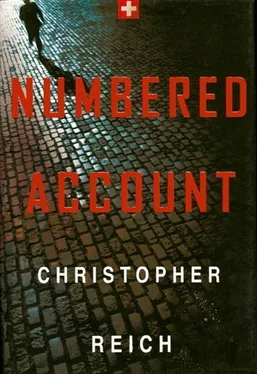“Let’s hope so.” Keep your eyes open and your mouth shut, his father’s stern voice reminded him. Become one of them.
Sprecher turned his attention back to the transfer of funds slip. He filled in the necessary information rapidly. When he was done, he checked the time, wrote it on the sheet, and finally signed it. “The Pasha requires our immediate and undivided attention. Therefore, it has become our practice to walk the sheet down to Payments Traffic in order to personally deliver it to Pietro, the clerk responsible for international transfers. When the Pasha says ‘Urgent,’ he means urgent. Come on, I’ll show you where you’ll be going every Monday and Thursday afternoon at three-fifteen.”
* * *
After work, Peter Sprecher invited Nick to join him for a beer at the James Joyce pub, a popular watering hole for bankers and insurance executives, owned and operated by one of the United Swiss Bank’s larger rivals, the mighty Union Bank of Switzerland. The pub was dark with low ceilings, lit by faux gas lamps and decorated with brass fixtures. Pictures of turn-of-the-century Zurich covered the walls.
Sprecher sat Nick in a corner booth and after quaffing an entire beer, began talking about his twelve years at the bank. He had started as a trainee fresh out of university, not so different from Nick. His first assignment had been a position on the trading floor. He’d hated it from day one. Every trader was held accountable for gains and losses in the investment “book” he managed, be it the Swiss franc versus the dollar, Iowa pork belly contracts, or South African platinum futures. That wasn’t for him, he happily admitted. Private banking was where he belonged. The days were hardly pressure filled. Success was determined by your ability to massage the client, to convince him that a four percent annual return really wasn’t something to fret about—and the bank took the heat for any poorly advised investments. It was heaven!
“The secret to this game,” he pronounced, “is to reckon exactly who your key clients are. The big fish. Take good care of them and everything else will fall into place.”
Sprecher hoisted a beer, sure to guard Nick’s eye. “Cheers. To your future at USB!”
Nick departed after a third beer, saying he was still jet-lagged from his flight over Friday night. He left the bar and walked the short distance up the Bahnhofstrasse to the Paradeplatz. It was only seven-fifteen, yet the streets were quiet. Few people passed in either direction. The stores were closed, their expensive wares lit only by dim night-lights. Waiting for the tram, he felt as if he were defying a curfew or the last man standing after some terrible pestilence. He stood shivering, bundled tightly in his too thin overcoat. A solitary figure in a foreign land.
Only a month ago he had been a member in good standing of Morgan Stanley’s fall batch of executive recruits. One of thirty blessed men and women (culled from a bumper crop of two thousand) who had deemed a starting salary of ninety thousand dollars, a signing bonus of seven thousand dollars, and a future promising untold millions adequate compensation for allowing the savviest brains on Wall Street to daily instill in them their combined and hard-earned knowledge. And not just another member of his class, but a leading one—for he had recently been offered his choice of positions as assistant to the chief of equity trading or junior member of the international mergers and acquisitions team, both plum assignments his fellow trainees would have killed, maimed, or mutilated to obtain.
On Wednesday, November 20, Nick received a call at work from his aunt Evelyn in Missouri. He remembered checking his watch the moment he heard her squeaky voice. Two oh five. He knew right away what she had to tell him. His mother was dead, she said. Heart failure. He listened as in lugubrious detail she chronicled his mother’s deterioration these past years. She chastised him for not visiting, and he said he was sorry. Finally, he got the date of the funeral, then hung up.
He received the news stoically. He recalled massaging his chair’s cool leather armrests as he struggled to show the proper shock and sadness at the news of his mother’s death. If anything, he felt lighter, the proverbial weight lifted from his shoulders. His mother was fifty-eight years old and an alcoholic. Six years had passed since he’d spoken to her last. In a burst of temperance and good intention, she had called to say that she’d moved from California to her hometown of Hannibal, Missouri. A new beginning, she’d said. Another one.
Nick found a flight to St. Louis the next day and from the Gateway to the West, rented a car and drove the hundred miles upriver to Hannibal. He had come in a spirit of reconciliation. He would see her buried. He would forgive her her lapses as a parent and as a self-respecting adult—if only to gild his tarnished memory of her.
His childhood had been a record of sudden disappointments, his father’s death being the first and of course the greatest. But others had followed, their arrival as regular as the change of seasons. Nick recalled them all—low points of a peripatetic adolescence flickering through his mind like an old, scratched film. His mother’s remarriage to a larcenous real-estate developer; his stepfather’s frittering away the insurance settlement, but not before delivering the family a financial coup de grace—losing Alex Neumann’s dream house at 805 Alpine Drive to repay a litigious investor; the Haitian divorce that followed.
Then came the “Fall”: a downward spiral through the curdled underside of southern California: Redondo Beach, El Segundo, Hawthorne. Another marriage came and went, this one briefer, less expensive—by then there was nothing left to split, settle, or divide. And finally, mercifully, at seventeen, the split from his mother. His own “new beginning.”
The day after the funeral, Nick drove downtown to a storage facility his mother had filled with reminders of her past. It was a grim task, sorting through her affairs. Box after box filled with souvenirs of a mundane and failed existence. A chipped piece of china he recognized as his grandmother’s gift to the newlyweds; a manila envelope stuffed with grade cards from elementary school; and a box of record albums containing such gems as Burl Ives’ Christmas Favorites, Dean Martin Loves Somebody, and Von Karajan Conducts Beethoven—the scratched soundtrack of his early childhood.
At day’s end, Nick came upon two sturdy cartons well sealed with brown electrical tape and marked “A. Neumann. USB—L.A.” Inside were his father’s effects taken from his office in Los Angeles days after his death: a few paperweights, a Rolodex, a calendar showing scenes of Switzerland, and two calfskin agendas for the years 1978 and 1979. Half the agendas’ pages were stained a muddy brown, swollen with the Mississippi floodwater that on two occasions had risen high inside the corrugated tin shed. But half were unharmed. And his father’s looping script was easily legible almost twenty years after he had written it.
Nick stared, transfixed, at the agendas. He opened a cover and skimmed through the entries. Nervous energy coursed through his body like a weak current. Hands that had mastered the buck of a sawed-off twelve gauge trembled like a schoolboy’s at his first communion. And for one quicksilver flash, his father was alive again, holding him on his lap in the downstairs study while a fire burned in the grate and a November rain pelted the windows. Nick had been crying, as he often did after hearing his parents argue, and father had taken his son aside to console him. Nick laid his head on his father’s chest and, hearing the heart beating too fast, knew that his father was also upset. His father hugged him tightly and caressed his hair. “Nicholas,” he said, his voice barely a whisper, “promise me that you’ll remember me all of your life.”
Читать дальше












